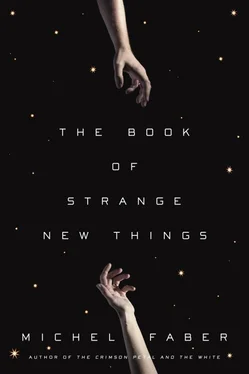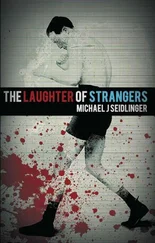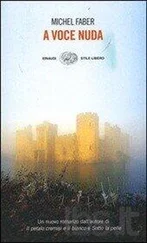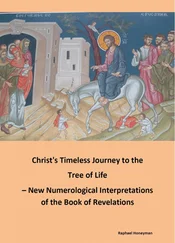Summarised like that, it sounded more like the serpent’s overtures to Eve in the Garden of Eden than Bea’s matter-of-fact allusions to Christianity in the hospital ward where she first met him. But it was interesting that the Oasan went to such strenuous effort to quote from John 3:16 verbatim. Kurtzberg must have taught them that.
‘Did Kurtzberg teach you that?’
The Jesus Lover who’d spoken did not reply.
‘Whosoever believes in him shall not perish, but have everlasting life,’ said Peter.
‘Amen,’ said Jesus Lover One, and the whole congregation murmured likewise. The word ‘amen’ seemed mercifully tailored to their mouths, or whatever part of their bodies they used to speak with. ‘Amen, amen, amen.’
The wedding photo reached an Oasan in an olive-green robe. He — or she? — recoiled.
‘Knife,’ the Oasan said. ‘Knife.’
It was true: in the picture, Peter and Bea were both clutching the hilt of an outsized knife, ready to cut the ceremonial slice from their wedding cake.
‘It’s a custom,’ said Peter. ‘A ritual. It was a very happy day.’
‘Happy day,’ echoed the Oasan, in a voice like wet bracken being crushed underfoot.
Peter shifted in his hammock, turned away from the rising sun. The molten orange light was getting a little intense. He lay on his back, staring up into the sky, and watched the purple retinal afterimages dancing in the cloudless expanse. Soon the after-images vanished and the sky was a uniform gold. Were the sunrises back home ever gold like this? He couldn’t recall. He could remember golden light on the bed, lighting up Joshua’s fur and the exposed curves of Bea’s legs if it was a warm morning and she’d kicked the sheets off. But that wasn’t the same as the whole sky being gold; the sky outside their bedroom would be blue, surely? He was annoyed with himself for forgetting.
There was so much to tell Bea, and he’d written too little of it down. When the next opportunity came for him to transmit a letter, he would no doubt manage, with the help of the notes he’d scribbled in his notebooks, to list the most significant things that had happened in the last three hundred and sixty hours. But he would miss the nuances. He would forget the quiet, unspoken moments of intimacy between him and his new friends, the unexpected glimmers of understanding in areas of communication that he’d assumed would be hopelessly dark. He might even forget to mention the gold sky.
His notebooks were in his rucksack, somewhere below. Perhaps he should’ve kept them up here in the hammock, so that he could jot down his thoughts and reflections whenever they came to him. But then he might stab himself in his sleep with the pencil, or the pencil might fall through the net onto the hard floor below. A pencil could land in such a way that the internal sliver of graphite got shattered in a dozen places, rendering it unsharpenable. Peter’s pencils were precious to him. Properly taken care of, they would continue to be of service when all the ballpoint pens had leaked and all the felt-tips had dried up and all the machines had malfunctioned.
Besides, he enjoyed the hours he spent in his hammock, free of anything to do. While he was on the ground, working with his flock, his brain was buzzing constantly, alive to challenges and opportunities. Every encounter might prove crucial in his ministry. Nothing could be taken for granted. The Oasans believed themselves to be Christians, but their grasp of Christ’s teachings was remarkably weak. Their hearts were full of amorphous faith, but their minds lacked understanding — and they knew it. Their pastor needed to concentrate hard every minute, listening to them, watching their reactions, searching for a glimpse of a light going on.
And, more mundanely, he also needed to concentrate on the physical jobs at hand: the carrying of stones, the spreading of mortar, the digging of holes. When the day’s work was over, and the Oasans had gone home, it was bliss to climb into his hammock, and know that he could do nothing more. As though the net had scooped him out of the stream of responsibility and suspended him in limbo. Not the Catholic idea of Limbo, of course. A benign limbo between today’s work and tomorrow’s. A chance to be a lazy animal, owning nothing but its skin, stretched out in the dark, or dozing in the sun.
The net from which his hammock had been fashioned was just one of several on the site. Nets were what the Oasans used for carrying bricks. They carried the bricks from… from where? From wherever the bricks came from. Then across the scrubland to the church. Four Oasans, each with a corner of the net knotted around his (or her?) shoulder, would march solemnly, like pallbearers, carrying a pile of bricks slung in between them. Even though the church site was not far from the main cluster of buildings — just far enough away to give it the necessary status of a place outside the common run of things — it was still quite a long walk, Peter imagined, if you were carrying bricks. There seemed to be no wheeled transport available.
Peter found this a little hard to believe. The wheel was a self-evidently nifty invention, wasn’t it? You’d think that the Oasans, even if they’d never conceived of it before, would have adopted the wheel as soon as they’d seen it being used by the USIC work-force. Pre-technological lifestyle was all very dignified, he wasn’t putting it down, but surely nobody, if they had a choice, would lug bricks around in a fishing net.
Fishing net? He called it that because that’s what it looked like, but it must have been designed for some other purpose — maybe even specifically for carrying bricks. There was nothing else to use nets for, here. There were no oceans on Oasis, no large bodies of water, and presumably no fish.
No fish. He wondered whether this would cause comprehension problems when it came to certain crucial fish-related Bible stories. There were so many of those: Jonah and the whale, the miracle of the loaves and the fishes, the Galilean disciples being fishermen, the whole ‘fishers of men’ analogy… The bit in Matthew 13 about the kingdom of Heaven being like a net cast into the sea, gathering fish of every kind… Even in the opening chapter of Genesis , the first animals God made were sea creatures. How much of the Bible would he have to give up as untranslatable?
But no, he mustn’t get too downhearted about this. His problems were far from unique; they were par for the course. Missionaries in Papua New Guinea in the twentieth century had been forced to find a way around the fact that the native people didn’t know what sheep were, and that the local equivalent — pigs — didn’t work so well in the context of the Christian parables, because Papuans regarded their pigs as prey to be slaughtered. Here on Oasis, he would be faced with similar challenges and he would simply have to find the best compromises he could.
All things considered, he and the Oasans were communicating very well so far.
He rolled onto his belly and looked though the netting at the ground below. His sandals were positioned neatly, side by side, directly underneath him, on the smooth cement floor. Oasan cement barely needed trowelling; it spread out almost by itself and dried with a satiny finish, feeling less like concrete to the touch than unvarnished wood. It had just enough traction for the soft leather boots of the Oasans not to slip on it.
Next to his sandals lay one of the few tools on the site: a large spoon, the size of a… how would he describe it to Bea? The size of a small spade? Bicycle pump? Police baton? Anyway, it wasn’t made of wood or metal, but of a kind of glass, as strong as steel. Its function was to stir the mortar in the mortar vat, preventing it from drying too quickly. Last night — that is to say, five or six hours ago — before he’d climbed into his hammock to sleep, he’d spent a good twenty minutes cleaning mortar off this spoon, scraping at it with his fingers. The debris lay scattered all around. He had done a thorough job, despite his tiredness. The spoon was ready for another day’s stirring. Father Peter was the one who did that job, since he was the strongest.
Читать дальше












